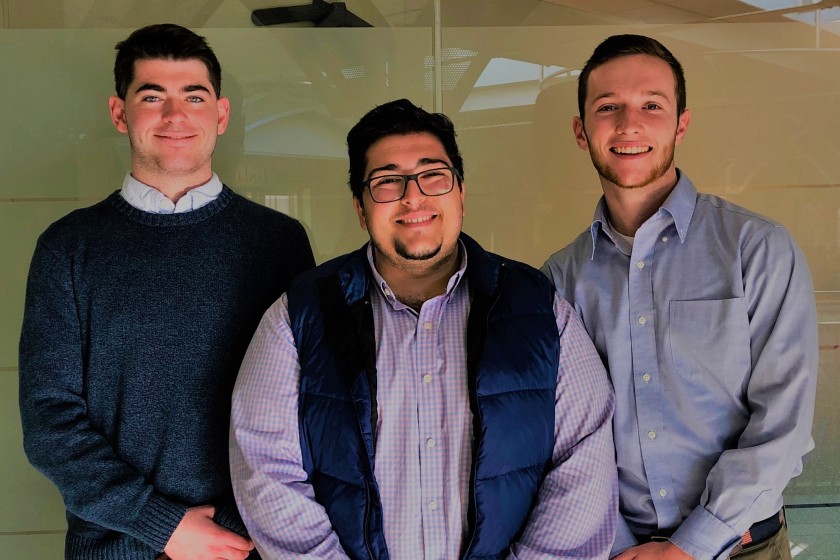
In October, 11 teams of College of Liberal Arts and Sciences (CLAS) students participated in UConn’s first-ever CLAS Case Competition. The competition was co-sponsored by the UConn Center for Career Development and Cigna, an avid recruiter of UConn students for internships and full-time opportunities. The case featured a health services company that was facing challenges with customer satisfaction due to problems with its app. Teams were faced with a decision of whether to find an in-house solution or turn to external options. Learn more about the case and the winning presentations on the UConn Center for Career Development’s website.
The winning team featured three pre-med students: Billy Gorman ’21 (CLAS), a physiology and neurobiology major; Drew Annabi ’20 (CLAS), a biological sciences major; and Ryan Kelly ’20 (CLAS), a molecular and cell biology major. I sat down with the team to find out more about their experience and takeaways from the competition.
LF: How did you find out about the CLAS Case Competition?
BG: I got an email about it, and it seemed interesting. My friends participated in a similar competition for the business school, and they said it was a good experience, so I figured it would be a good experience for me and my friends.
RK: Billy threw it out into our biochem class group chat, and I was pretty immediately interested because I did DECA in high school and I really liked it.
LF: What was your first impression when you received the case?
DA: My first thought when I read it was, “oh, this is business.” After that initial reaction, we just dove right in. I immediately made an Excel spreadsheet to try to graph out projected profits and operating costs and things like that.
BG: I was definitely surprised, too. When I saw CLAS Case Competition, I figured it would have something to do with science because that’s what I think of when I think of CLAS, but then I realized that CLAS covers a broader range rather than just science.
RK: It was a lot to digest at first. We definitely looked at it from the numbers approach first, seeing how we could manipulate and work with them to start figuring out a path to take.
DA: We knew that if we could pick a path that we could back up and argue effectively, we would be able to build a whole presentation around it.
LF: As CLAS students, were you able to apply what you already knew to address this case?
RK: I think we could apply what we knew. Obviously we had to do some research, but business majors would have had to do the same research we did. It was pretty applicable to everybody.
BG: As we were going through the case more and more, it reminded me of some presentations I make for my lab meetings. My principal investigator stresses making the presentation more about a story rather than just presenting the facts. For example, I try to show why and how something is happening rather than just explaining what happened. It was the same for this; we had to discuss why we chose our plan and how we were going to execute it.
RK: Also, we are all in leadership roles with an academic fraternity together, so we’re used to working with each other through problems we don’t know the answer to, and having that experience really helped.
LF: What are your main takeaways from this CLAS Case Competition?
BG: It was really good for giving context about the healthcare industry as a whole. [As physicians,] we’re going to be a small part of it, but there is all this other stuff, like insurance, that we’re going to have to know how to deal with.
DA: We learned a lot more about the healthcare services field at large, like different mergers and how those affected healthcare providers and patients. You get a bigger picture of what is going on than what you’re used to.
RK: We’re part of the generation that is seeing everything become more and more technology-based. People are no longer using a family physician; they can go on this website and find every physician in the area and choose the best one. It also brought up other issues with software in healthcare. How does treatment work when there are glitches with these online services?
DA: Especially today with all these data leaks, [data security] is important with cloud-based data. From a patient and physician perspective, it’s something to want to have a solution for.
LF: What perspective(s) do you think you brought to this case as CLAS students? What are some benefits of participating you’d like to share with other CLAS students?
DA: I highly recommend this competition to other CLAS students. Research is something that I think science students are very prepared for. Our classes focus on being able to digest large amounts of information and boil it down to its constituent parts. We can also think critically to solve complex problems, adjust on the fly, and change our plan as we gather more information.
BG: Related to critical thinking, our biochemistry professor gives a bunch of answers that probably are right and asks not for the right answer but the best answer. So, you have to really take what the question gives you and use previously acquired knowledge to figure out the best option.
RK: There is so much that is transferrable. A lot of people say that public speaking is one of their weaknesses, and speaking in front of representatives from a company adds a little bit of extra pressure. Putting yourself in that position can never be a harmful thing.
